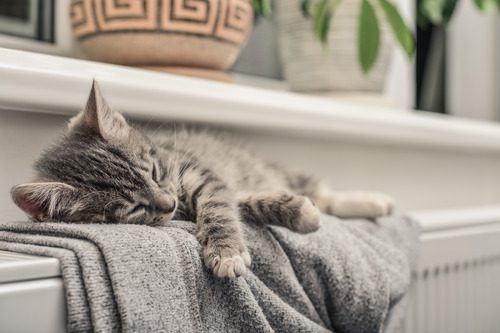Do Cats Have Periods?
Many pet owners are surprised when they notice behavioral or physical changes in their female cat and might wonder, do cats have periods? While cats experience a reproductive cycle similar to menstruation in some ways, it’s quite different from what humans experience. Learning more about your cat’s cycle can help you understand their behavior and support their health. If you ever have concerns about your cat’s reproductive health, the team at Dundee Veterinary Clinic is here to help. Call us at 734-529-2429 to make an appointment. Let’s take a closer look at how the feline reproductive cycle works and what you should know if your cat is not spayed.

What Happens During a Cat’s Heat Cycle?
Cats do not have periods the same way humans do. Instead, they go through what is known as an estrous cycle, commonly referred to as “being in heat.” Understanding what happens during this time can answer the question, do cats have periods, and explain the signs you may see.
The estrous cycle includes several stages, and cats can cycle multiple times throughout the breeding season, which usually takes place from early spring to late fall. Unlike humans, cats are induced ovulators, meaning they only release eggs after mating. If no mating occurs, they will return to heat every few weeks until they become pregnant or are spayed.
Cats in heat often show very distinct behaviors, such as:
- Increased vocalization
- Restlessness
- Affectionate rubbing
- Rolling on the floor
- Raising the hindquarters when stroked
While some cats may experience a small amount of bloody discharge, it is very minimal compared to a human menstrual period. If you notice significant bleeding, it is important to consult with your veterinarian right away.
How Often Do Cats Go Into Heat?
Since cats do not have periods in the human sense, the question of whether cats have periods ties closely to understanding how often they go into heat. Female cats can enter their first heat cycle as early as four to six months of age. If not bred or spayed, they can go into heat every two to three weeks.
Influencing Factors on the Heat Cycle
Several factors influence how often a cat goes into heat:
- Seasonal Changes: Longer daylight hours during spring and summer can trigger more frequent cycles.
- Indoor vs. Outdoor: Indoor cats may cycle year-round because artificial lighting can mimic longer days.
- Breed Differences: Some breeds, like Siamese cats, may have longer or more frequent heat cycles.
Frequent heat cycles can be stressful for both cats and owners. Spaying your cat is the best way to prevent these cycles and reduce the risk of certain health problems.
Signs Your Cat Is In Heat
Recognizing the signs of a cat in heat can help answer the question, do cats have periods, and prepare you to manage this natural behavior.
Common Behavioral Changes
During heat, your cat may:
- Vocalize loudly and frequently, often sounding distressed.
- Become unusually affectionate, rubbing against people and objects.
- Attempt to escape outside in search of a mate.
- Display mating postures, such as crouching with the front body lowered and rear raised.
Physical Changes to Watch For
You might notice:
- Slight swelling of the vulva
- Increased grooming, particularly in the genital area
- Occasional light discharge, although heavy bleeding is rare
If you see unusual symptoms like persistent bleeding or signs of discomfort, contact Dundee Veterinary Clinic for an appointment at 734-529-2429.
Can Cats Have Health Issues Related to Their Cycle?
When considering the question do cats have periods, it is important to understand that reproductive health problems can develop if a cat is not spayed.
Risks Associated With Not Spaying
Cats that are not spayed face an increased risk of:
- Pyometra: A serious uterine infection that can be life-threatening if untreated.
- Mammary Tumors: The risk of developing mammary cancer increases if a cat is not spayed before her first heat.
- Behavioral Problems: Repeated heat cycles without breeding can cause stress and behavioral issues.
Spaying your cat not only prevents unwanted litters but also supports their long-term health. Our veterinary team in Dundee is happy to discuss spaying and its benefits in more detail.
Do Cats Bleed When They Are In Heat?
When pet owners ask, do cats have periods, they often want to know whether cats bleed during heat. While a small amount of bloody discharge can sometimes occur, it is uncommon and generally very light. Heavy or consistent bleeding is not normal and should prompt a veterinary visit. Unlike human menstruation, a cat’s estrous cycle does not involve the shedding of the uterine lining. Instead, it focuses on preparing the body for mating. If you notice bleeding from your cat’s vulva or other unusual symptoms, contact our team at Dundee Veterinary Clinic by calling 734-529-2429.
How Spaying Affects the Reproductive Cycle
Spaying completely prevents your cat from going into heat and eliminates the behaviors associated with it. It also addresses if cats have periods by stopping the hormonal changes that trigger the estrous cycle.
Health and Behavioral Benefits of Spaying
Spaying offers several advantages:
- Prevents unwanted pregnancies
- Reduces the risk of uterine infections and cancers
- Eliminates disruptive heat behaviors
- Helps control the cat population in the community
At Dundee Veterinary Clinic, we recommend scheduling your cat’s spay surgery before their first heat cycle when possible. Early spaying offers greater protection against certain health risks.
Why Understanding Your Cat’s Reproductive Cycle Matters
As a responsible cat owner, learning the answer to do cats have periods helps you better care for your pet. Knowing what to expect during your cat’s heat cycle can guide your decisions about spaying and reproductive health. Every cat is different, and understanding your cat’s unique needs is part of building a strong, healthy bond. Whether you are considering spaying your cat or simply have questions about her behavior, our caring team at Dundee Veterinary Clinic is here to support you. Call 734-529-2429 today to schedule an appointment.
Recent Posts
About Us
At Dundee Veterinary Clinic, we cherish your pets as part of your family, and we value your role as their primary caregiver. Through honest communication, education, and support for your pet’s needs, our veterinarians aim to provide them with a lifetime of excellent care. We want to ensure that you and your companions get to spend many happy years together.
